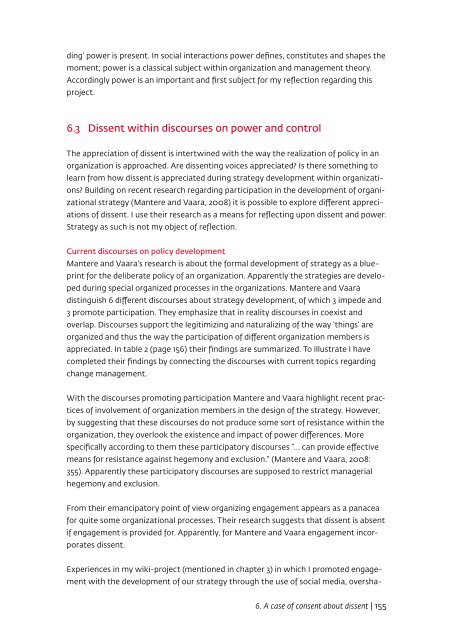Rumbling on performativity_Frits Simon
Rumbling on performativity_Frits Simon
Rumbling on performativity_Frits Simon
You also want an ePaper? Increase the reach of your titles
YUMPU automatically turns print PDFs into web optimized ePapers that Google loves.
ding’ power is present. In social interacti<strong>on</strong>s power defines, c<strong>on</strong>stitutes and shapes the<br />
moment; power is a classical subject within organizati<strong>on</strong> and management theory.<br />
Accordingly power is an important and first subject for my reflecti<strong>on</strong> regarding this<br />
project.<br />
6.3 Dissent within discourses <strong>on</strong> power and c<strong>on</strong>trol<br />
The appreciati<strong>on</strong> of dissent is intertwined with the way the realizati<strong>on</strong> of policy in an<br />
organizati<strong>on</strong> is approached. Are dissenting voices appreciated? Is there something to<br />
learn from how dissent is appreciated during strategy development within organizati<strong>on</strong>s?<br />
Building <strong>on</strong> recent research regarding participati<strong>on</strong> in the development of organizati<strong>on</strong>al<br />
strategy (Mantere and Vaara, 2008) it is possible to explore different appreciati<strong>on</strong>s<br />
of dissent. I use their research as a means for reflecting up<strong>on</strong> dissent and power.<br />
Strategy as such is not my object of reflecti<strong>on</strong>.<br />
Current discourses <strong>on</strong> policy development<br />
Mantere and Vaara’s research is about the formal development of strategy as a blueprint<br />
for the deliberate policy of an organizati<strong>on</strong>. Apparently the strategies are developed<br />
during special organized processes in the organizati<strong>on</strong>s. Mantere and Vaara<br />
distinguish 6 different discourses about strategy development, of which 3 impede and<br />
3 promote participati<strong>on</strong>. They emphasize that in reality discourses in coexist and<br />
overlap. Discourses support the legitimizing and naturalizing of the way ‘things’ are<br />
organized and thus the way the participati<strong>on</strong> of different organizati<strong>on</strong> members is<br />
appreciated. In table 2 (page 156) their findings are summarized. To illustrate I have<br />
completed their findings by c<strong>on</strong>necting the discourses with current topics regarding<br />
change management.<br />
With the discourses promoting participati<strong>on</strong> Mantere and Vaara highlight recent practices<br />
of involvement of organizati<strong>on</strong> members in the design of the strategy. However,<br />
by suggesting that these discourses do not produce some sort of resistance within the<br />
organizati<strong>on</strong>, they overlook the existence and impact of power differences. More<br />
specifically according to them these participatory discourses “… can provide effective<br />
means for resistance against hegem<strong>on</strong>y and exclusi<strong>on</strong>.” (Mantere and Vaara, 2008:<br />
355). Apparently these participatory discourses are supposed to restrict managerial<br />
hegem<strong>on</strong>y and exclusi<strong>on</strong>.<br />
From their emancipatory point of view organizing engagement appears as a panacea<br />
for quite some organizati<strong>on</strong>al processes. Their research suggests that dissent is absent<br />
if engagement is provided for. Apparently, for Mantere and Vaara engagement incorporates<br />
dissent.<br />
Experiences in my wiki-project (menti<strong>on</strong>ed in chapter 3) in which I promoted engagement<br />
with the development of our strategy through the use of social media, oversha-<br />
6. A case of c<strong>on</strong>sent about dissent | 155



